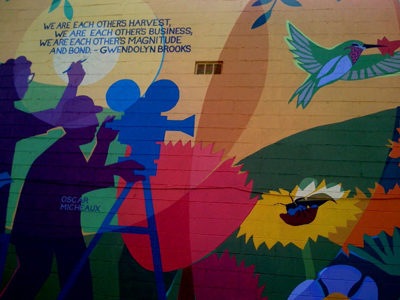
"We are each other's harvest; we are each other's business; we are each other's magnitude and bond." Gwendolyn Brooks
Dave Lowenstein and Gwendolyn Brooks hooked me. Just over two years ago, I was contemplating my stay in Lawrence, Kansas and sorting out future plans. The circumstances that brought me there weren't going to keep me there. All my work was in New York and Los Angeles. I had no compelling reason to stay. Then I walked by a mural.
The mural, replete with brilliant images of incredible African-American artists connected to Kansas, is the backdrop for Lawrence's Saturday Farmers' Market. But that particular Sunday was scorching hot and downtown was a ghost town. The one car parked in front of the colorful wall at 9th and New Hampshire featured a bumper sticker demanding a living wage for Lawrence. I got up close to the words. I took a photo of the bumper sticker. In that sticky, solitary, epiphanic moment, everything became clear. I wanted to stay in this small town in a flat state, because of our magnitude and bond.
While I've always been committed to social and environmental issues, I've gotten extra love over the last few years as everyone everywhere tries to "go green." (Green Barbie? Really? You're made of petroleum.) On Wednesday, I appeared on the Oprah Winfrey Show in honor of Earth Day. The amount of exposure given to issues that I hold dear is exciting and I am thrilled and honored to be asked back on Ms. Winfrey's show. We have to begin with the basics and Oprah has done an incredible job of getting people started on all kinds of important journeys.
In my work as an environmental journalist, I'm delighted that people want to know what they can do to make things better. I've suggest reusable cotton bags in lieu of paper or plastic, explained why I prefer BPA-free stainless steel bottles over reusable plastic ones, and talked about how the mercury in CFLs create less toxic waste than the mercury generated through the use of inefficient incandescent light bulbs.
But as the Earth Day green-hype winds down, it's also the media's job to let you know that the planet won't be saved in 10 Easy Steps. Small changes are an essential first move and I applaud all who make them. However, we don't get to check the Earth off the list after we've bought the hybrid and recycled. Going green is messy and complex. It takes time, dedication and a willingness to make new mistakes. And it requires all of our efforts. Not just those of a certain educational level, socio-economic strata, or hip/hippy threshold. After we tackle plastic, we have to address policy. As I tell my students at the University of Kansas School of Journalism, environmentalism is about our relationship with and to our world. And as we all know, the best relationships are the ones we work on.
We are our eco-system. Everything we use - from energy to food to the stuff of our everyday lives - has an impact. "Going green" doesn't just mean buying more products. A good starting point is to buy different stuff (zero VOC paint, non-toxic cleaning products, reusable bags and bottles...) but, ultimately, we can't shop our way to sustainability. Reduce is the first edict of environmentalism, with Re-use and Recycle following close behind.
It is our relationships - to the planet, to our stuff, to our communities - that contain the most potential for widespread change. Historically, the environmental movement was about land conservation and wildlife protection. Jerome Ringo, the first person of color to head a national environmental organization, described to me the folks involved in early environmentalism as "the people who would catch a fish to hang it on the wall, not to put a fish on their plates." Today, everyone can and must have a seat at the table: from folks fishing in Kansas' Kaw River to dairy farmers herding cattle (apologies, vegans). We have to stop tearing each other apart and find common ground. Low income communities and communities of color have borne the brunt of environmental injustices - including our addictions to oil and coal. The most polluting industries end up in the neighborhoods that are most vulnerable. And research shows that, when controlling for other factors, race is the strongest determinant of where toxic waste, dirty energy, and other contaminants will end up.
Being green isn't just about screwing in a CFL. Beyond the light bulbs and tote bags, we have to be aware of how our lifestyles affect our community, and the other communities and ecosystems that border our own. This is a lesson that I learned in Lawrence, where every environmental decision requires buy-in from neighbors who may not share my passion for environmentalism or point of view. Two years after my initial decision to put down roots in Kansas, I'm working on a book about the incredible environmental lessons I have learned in a red state that doesn't seem to paint itself green. The book will be published by Harper One next summer and focuses on a redefinition of environmentalism that includes conservatives, farmers, laborers, hunters, even climate change skeptics. As environmentalists, it is our relationships with each one of these constituents that will define our ability to conserve resources and protect our planet.
We are each other's magnitude and bond.
This piece was written by Simran Sethi, with Merete Mueller. With thanks to the University of Kansas School of Journalism and The Lawrencian, where an earlier version of this article appeared.